5 things to watch on Trump’s trip to Europe
Trump departed Sunday for a five-day trip to Europe.
President Donald Trump departed Sunday for a five-day trip to Europe, heading first to the United Kingdom for a three-day state visit before continuing on to Ireland, where he will meet with the prime minister and visit one of his Trump-branded properties and pay his respects at Normandy on the 75th anniversary of D-Day.
Here are the storylines to watch:
The Royal Treatment
While the ceremonies of the president’s state visit to the United Kingdom are not expected to yield any concrete policy achievements, the honorary trip carries symbolic value in reinforcing the United States’ special alliance with its closest ally.
During his working visit to the UK last year, the president himself described the US-UK relationship as “the highest level of special,” and the state visit is designed to showcase that relationship in grand fashion over the three days of events.
“This will be a visit of symbolism,” Heather Conley, an expert on the US-UK relations at the Center for Strategic and International Studies. “The president is very enthusiastic about meeting the royal family. You’ll have to ask the royal family if the level of enthusiasm is the same.”
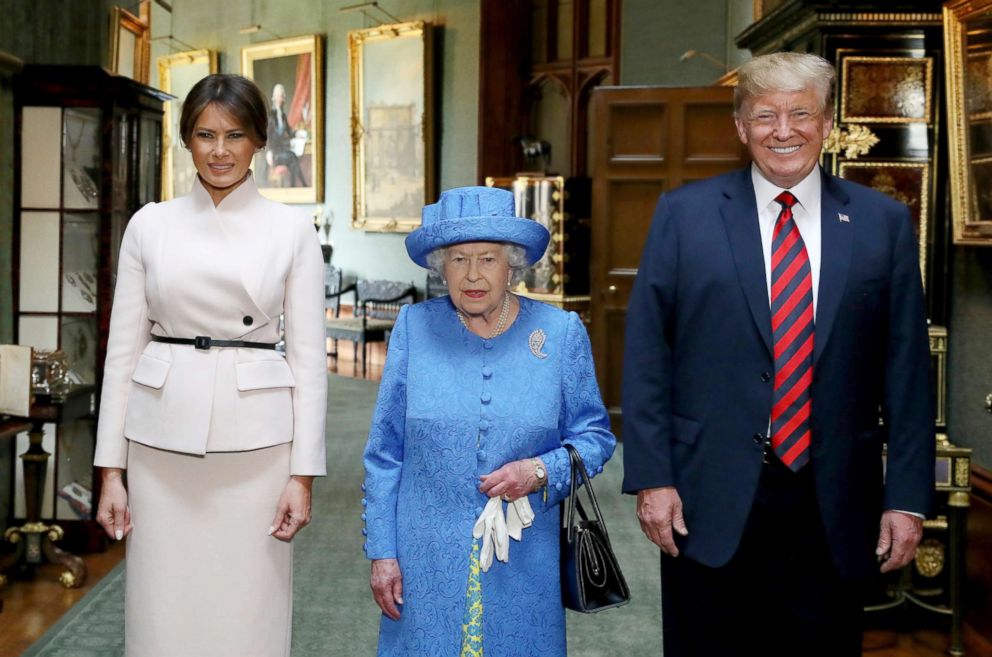
And In a significant gesture during the trip – in addition to the queen hosting a formal banquet at Buckingham Palace – the president and first lady will join the heir Prince Charles and his wife Camilla, the Duchess of Cornwall, for tea at their official residence, Clarence House.
With all that royal treatment comes the risk of a presidential breach of royal protocol or the possibility of an improper interaction.
Royal commentator Robert Jobson expressed confidence that the American president will have been thoroughly briefed on royal etiquette. And in the event of any tricky or uncomfortable moments that might arise with the president, Jobson said the queen can be expected to smooth over any potential awkwardness.
“The Queen has dealt with political leaders since Winston Churchill. They’re not always the easiest people to get along with. She gets along with everybody,” Jobson said. “Out of all the people that can keep President trump … in line, will certainly be the Majesty the Queen.”
While the president is expected to meet with the most high-ranking members of the Royal Family, there is one potentially awkward encounter the president will avoid: The American Duchess of Sussex, Meghan Markle. Meghan remains on maternity leave following the birth of son Archie and will not attend any of the events, according to the Palace. Her husband, Prince Harry, is expected to meet the president when the queen welcomes him to Buckingham Palace for a private lunch.
“Meghan is officially on maternity leave, Harry too, so they’ve got an excuse,” Jobson said. “Also, you’ve got to remember that despite them being this fixation for the media, Meghan and Harry are very low down the pecking order in terms of a state visit. You’ve got more important, senior members of the Royal family there.”
Both Trump and Meghan have been publicly critical of one another. Prior to marrying into the royal family, Meghan publicly criticized Trump as a “misogynist” during the 2016 campaign and suggested she'd be inclined to live in Canada if he were elected president. And Trump has, in turn, has called the duchess “nasty.”
“I didn’t know that she was nasty,” Trump said in a recent interview with the British new outlet, The Sun, when asked about her past criticism. The president also said in the interview that he thinks "it's nice" that there's an American duchess and added, "I’m sure she will do excellently."
The president and his children, who are joining him on the trip, are expected to meet Prince William and Kate, the Duke and Duchess of Cambridge, during the official events. But Jobson said he doesn’t expect the young royal couple in direct line to the throne to receive the visiting First Family in the same personal terms by which the Obamas were welcomed.
President Obama and former First Lady Michelle Obama had an intimate dinner at Kensington Palace with Prince William and Kate, along with Prince Harry, during which the Obamas were even greeted by a pajama-clad Prince George.
“I don’t think it will get that cozy, this is really the Queen’s gig,” Jobson said.
Navigating the Politics of Brexit
Even as the president’s visit to the UK is more for the ceremony than the substance, the state visit couldn’t come at a more politically fraught time in London.
It was just a little over a week ago that Prime Minister Theresa May announced her resignation and just days from now that May has said she will officially step down as her party’s leader.
May’s departure comes after several failed attempts to complete the central task on which she was elected: Producing an agreement to exit the European Union, known as Brexit, following a referendum vote. But the task of carving a path forward through a divided parliament ultimately proved insurmountable to May, who also lost the faith of many in her own cabinet.
Meanwhile, the clock is ticking down for the UK to forge or a way forward or risk a perilous break from the European Union with no deal in place when Brexit is set to take effect at the end of October.
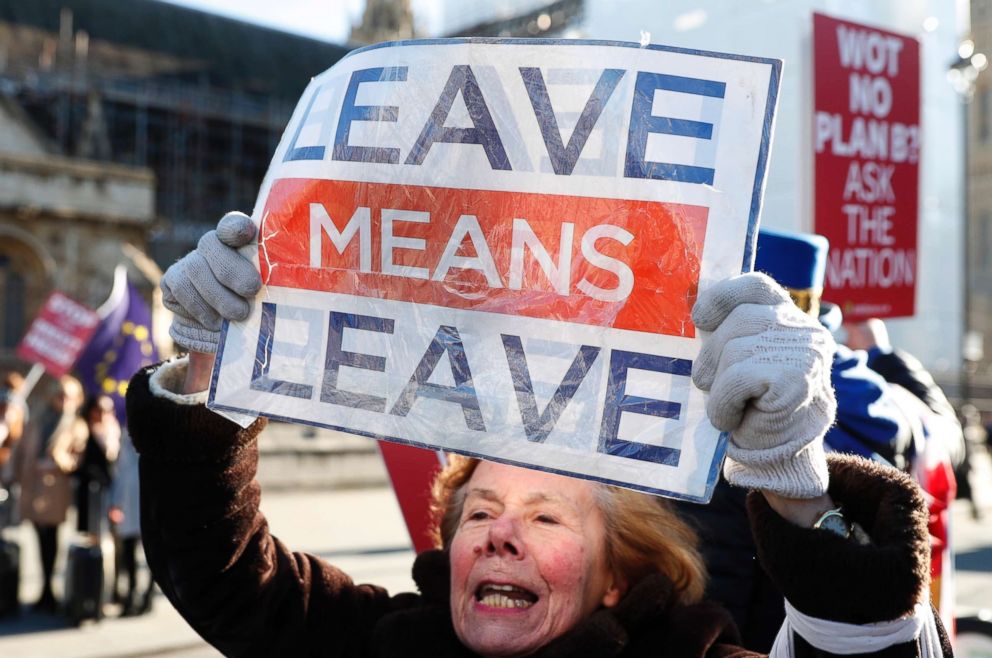
“The substantive issues here are very challenging and the UK is undergoing a very significant leadership contest and increasingly looking like they may leave the EU without a deal this fall, so the challenges are enormous,” Conley said.
While the UK’s internal politics couldn’t be more complicated on their own, the president has already shown in an interview to the British news outlet The Sun that he isn't likely to keep his opinions to himself, something Conley said would “make a very difficult situation even worse” for the president's host, the British government.
The president criticized May's handling of Brexit in the interview, telling the Sun that she should have "negotiated from strength" by making more demands of the EU during the course of negotiations.
“I had mentioned to Theresa that you have got to build up your ammunition," Trump said. “You have to build up your side in terms of points, or you are just going in and asking, I mean it was just asking and you know, they would say whatever they wanted.”
Beyond the issue of Brexit, the president has also waded into the leadership contest for the next prime minister, expressing his favor for Boris Johnson, who is vying to be the next prime minister, calling him a "friend of mine."
“I think Boris would do a very good job. I think he would be excellent,” Trump said of Johnson in his interview with The Sun.
Though the president stopped short of an explicit endorsement of Johnson, he added: "I like him. I have always liked him. I don’t know that he is going to be chosen, but I think he is a very good guy, a very talented person."
Johnson previously served as May’s foreign minister but resigned from her cabinet in protest of her handling of Brexit.
The president has also offered praise for Brexit Party leader Nigel Farage, who actually campaigned alongside Trump during the 2016 campaign as the two drew parallels between Trump’s anti-establishment campaign and the UK’s Brexit vote.
The president has not ruled out the possibility of meeting with either Johnson or Farage during his visit. If he does, Conley says, it would be seen as an insult to the outgoing prime minister, who views Johnson as “the politician that is ripping apart the conservative party” she leads.
“How would President Trump feel if Theresa May were to come here and hold an open meeting with Joe Biden and say how much she thought Biden is a fantastic politician and wishes him well?” Conley asked rhetorically. “The president would, of course, take great offense.”
“You don’t seek to embarrass your host, you seek to strengthen the relationship,” Conley said. “But we’ve grown accustomed to the norm-breaking by this president.”
In addition to the tricky diplomacy surrounding Johnson and Farage, there’s another local politician who the president has not held back from publicly sparring with in the past: London Mayor Sadiq Khan.
Last June, Trump blasted Khan as a “pathetic” and criticized his handling of the London Bridge terrorist attack, which killed eight people.
Khan has, in kind, also not held back from entertaining a public feud with the president. Ahead of the president’s state, Khan has shown he’s not backing down from his approach of publicly criticizing the president, saying in a recent interview that Trump is “not in the same class” as the two previous U.S. presidents honored with a state visit.
“We should have a close relationship with the president of the USA, but we shouldn't be rolling out the red carpet, we shouldn't have a state banquet," Sadiq said in an interview with British radio station LBC. "And actually, history tells us only two [U.S.] presidents have had a state visit. President Trump is not in the same class as those two."
It remains to be seen whether the president, who is not one to let slights go unchallenged, will be able to resist the urge to fire back at Khan’s latest jab.
Protests
While the president will avoid a potentially awkward encounter with the American duchess, one thing he likely won’t be able to avoid on this visit to London will be the large protests that are expected. Those demonstrations will stand in stark contrast to the otherwise warm welcome Trump is expected to receive from those in the British government taking part in the official events.
On his working visit to the UK last year, there were massive protests in the capital that included a large orange blimp that portrayed the president as a baby wearing a diaper – and is expected to take to the skies of London again for this visit. The president acknowledged in an interview with the British newspaper The Sun that last year’s protests in the British capital made him feel unwelcome.
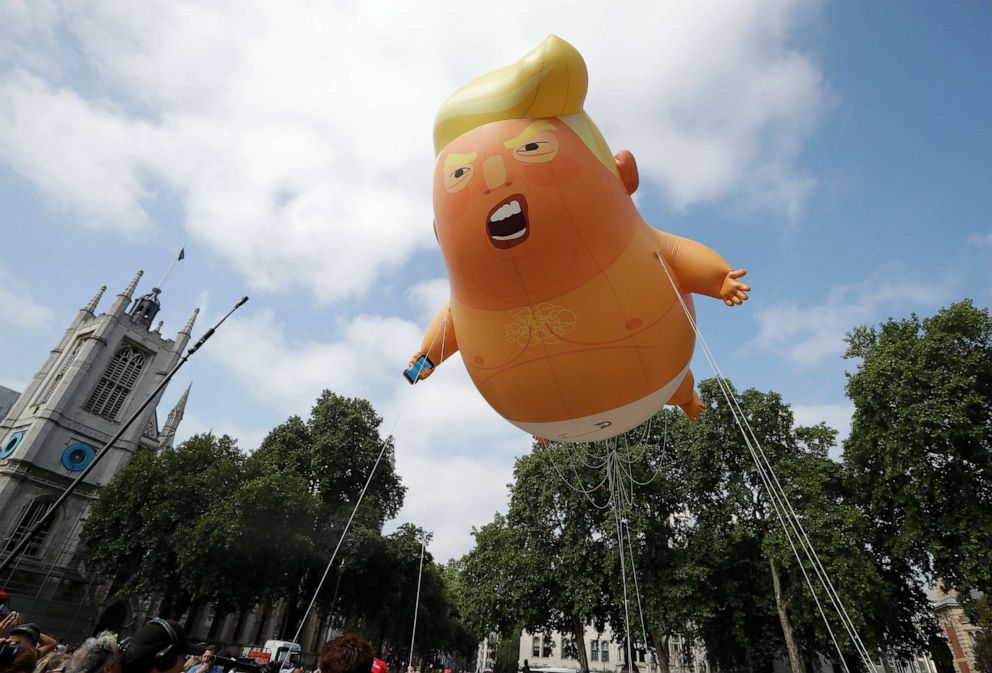
“I guess when they put out blimps to make me feel unwelcome, no reason for me to go to London," Trump said of the blimp in the Sun interview. “I used to love London as a city. I haven’t been there in a long time. But when they make you feel unwelcome, why would I stay there?"
Last year’s visit was choreographed in such a way that the president was mostly able to avoid passing by the large protests. But on the state visit, which will take him to many of the main sites in London, it will be almost impossible that the president won’t pass a demonstration or two.
Will Trump reinforce or question bonds with allies
Two days of events during the president’s visit are organized around celebrating the 75th anniversary of D-Day and the close alliance between the US and its European allies that helped turn the tide of World War II against Nazi Germany.
“I’m hopeful that this is a powerful experience for the president in understanding the strength of alliances and it’s why the Greatest Generation created NATO,” said Conley.
But while the events will be an easy opportunity for the president to reinforce those close bonds, Conley also raised concern around the possibility that the president could go off-script and somehow raise doubt about the United States’ commitment to the joint security alliance.
“If he takes the opportunity to raise issues like European defense spending or undercuts NATO, again, this simply undercuts U.S. national security and it’s difficult for me to imagine a U.S. commander in chief wishing to do that,” Conley said.
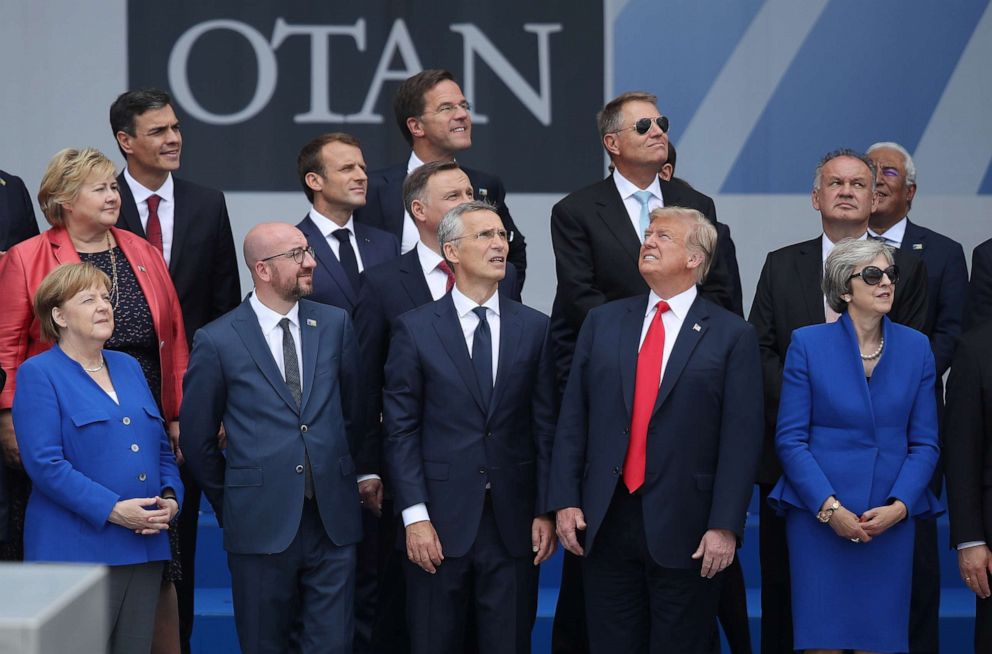
On more than one occasion, President Trump has rattled the foundations of the US-European security alliance, formalized through NATO, by seeming to question the United States' unconditional commitment to the Article 5 principle that defines an attack on one of the NATO allies as an attack against them all.
Article 5 has only been activated on one occasion since the alliance was begun, and it was done so in the aid of the United States following the terrorist attacks of September 11, 2001.
Tracing Reagan’s Footsteps
With his visit to Normandy on the occasion of the 75th anniversary of the D-Day invasion that is remembered as the turning point in the Allied effort against Nazi Germany in World War II, the president will be completing a pilgrimage completed by many modern presidents before him.
The tradition of visiting the site of the Normandy invasion on the D-Day anniversary was first started by Ronald Reagan, whom the president praises as one of history’s finest US presidents and has in many ways sought to model.
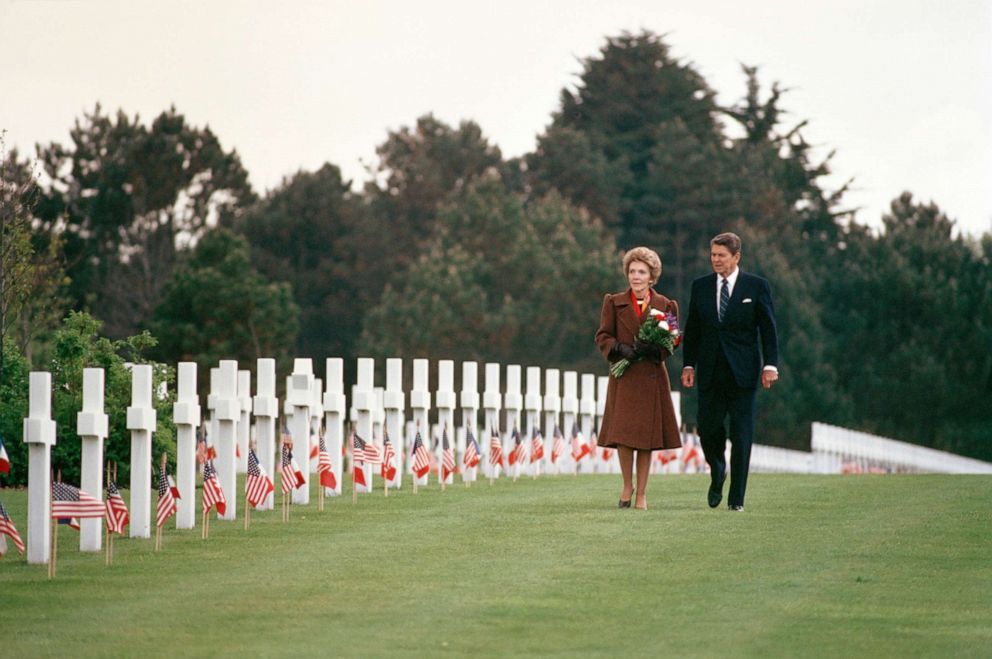
President Jimmy Carter was the first U.S. president to ever travel to Normandy but his visit did not coincide with the anniversary.
Since Reagan visited Normandy in marking the 40th D-Day anniversary, Presidents Bill Clinton, George W. Bush, and Barack Obama have also all made an anniversary pilgrimage to Normandy.
The last major anniversary commemoration was attended by President Obama, five years ago, to mark the 70th anniversary.




